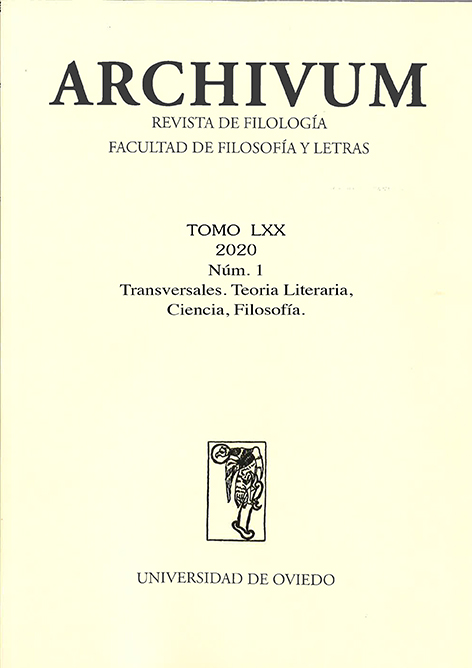Abstract
In this paper, a novel way is proposed for the study of literary creativity, from the Neuroscience and the Theory of Literature, with some considerations about cultural anthropology, through an interdisciplinary formulation. With this, we seek to formulate solid foundations in the field of Literary Theory. This proposal aims to analyze succinctly, on the one hand, the incidence of the literary institution and the creation of mental images, as essential elements for poetic creativity, as well as the role of memory, human capacity that articulates the creative process, through the linguistic formulation of the mental images and the knowledge of the conventions coming from the literary institution. To this, it would be necessary to unite the question of the ascription of a determined form to a determined content, through the exercise (to acquire the literary technique) and the intuition so that this ascription occurs automatically.References
Abraham, A. (2018) The neuroscience of creativity, Cambridge-New York, Cambridge University Press.
Alexandrov, V. E. (2007) “Literature, Literariness, and the Brain”, Comparative Literature, 59.2, 97-118.
Andreu, B. (1986) [19811] De una niña de provincias que se vino a vivir en un Chagall, Madrid, Hiperión.
Arduini, S. (2000) Prolegómenos a una teoría general de las figuras, Murcia, Universidad de Murcia.
Beaty, R. E., Silvia, P. J., Benedek, M. (2017) “Brain network underlying novel metaphor productions”, Brain and Cognition, 111, 163-170.
Boyd, B. (2009) On the Origin of Stories: Evolution, Cognition and Fiction, Cambridge (MA), Harvard University Press.
Burke, M. (2013) “The rhetorical neuroscience of style: On the primacy of style elements during literary discourse processing”, Journal of Literary Semantics, 42, 2, 199-215.
Burke, M., Troscianko, E. T. (ed.) (2017) Cognitive Literary Science. Dialogues between Literature and Cognition, New York, Oxford University Press.
Caracciolo, M. (2016) “Cognitive Literary Studies and the Status of Interpretation: An Attempt at Conceptual Mapping”, New Literary History, 47, 187-208.
Changeux, J.-P. (2011) “The Epigenetic Variability of Memory: Brain Plasticity and Artistic Creation”, en Nalbantian, S., Matthews, P. M., McClelland, J. L. (ed.), The Memory Process. Neuroscientific and Humanist Perspectives, London, The MIT Press, 55-72.
Chomsky, N. (2014) [19651] Aspects of the Theory of Syntax, Cambridge (MA)-London, The MIT Press.
Crane, M. Th., Richardson, A. (1999) “Literary Studies and Cognitive Science: Toward a New Interdisciplinarity”, Mosaic, 32, 2, 123-137.
Damasio, A. (2010) Self Comes to Mind. Constructing the Conscious Brain, New York, Pantheon Books.
Dubuisson, D. (1996) Anthropologie Poétique. Esquisses pour une anthropologie du texte, Louvain-la-Neuve, Peeters.
Gigerenzer, G. (2008) Decisiones instintivas. La inteligencia del inconsciente, Barcelona, Círculo de Lectores.
Harrison, Ch., Stockwell, P. (2014) “Cognitive poetics”, en Littlemore, J., Taylor, J. R. (ed.), The Bloomsbury Companion to Cognitive Linguistics, London, Bloomsbury, 218-233.
Hayles, N. K. (2014) “Cognitive Everywhere: The Rise of the Cognitive Nonconscious and the Costs of Consciousness”, New Literary History, 45, 2, 199-220.
Hegel, G. W. F. (1989) [18351] Estética, Barcelona, Ediciones Península, 2 vols.
Horacio Flaco, Q. (1996) Sátiras. Epístolas. Arte poética, Madrid, Cátedra.
Howes, M. B., O’Shea, G. (2014) Human Memory. A Constructivist View, San Diego (CA), Elsevier.
Jung, R. E., Varnatian, O. (ed.) (2018) The Cambridge Handbook of the Neuroscience of Creativity, Cambridge, Cambridge University Press.
Kant, I. (1989) [17901] Crítica del juicio, Madrid, Espasa-Calpe.
Kaufman, J. C. (2002) “Dissecting the Golden Goose: Components of Studying Creative Writers”, Creativity Research Journal, 14, 1, 27-40.
Kormos, J., Trebits, A. (2012) “The Role of Task Complexity, Modality, and Aptitude in Narrative Task Performance”, Language Learning. A Journal of Research in Language Studies, 62, 2, 439-472.
LeBoutillier, N., Marks, D. F. (2002) “Mental imagery and creativity: A meta-analytic review study”, British Journal of Psychology, 94, 1, 29-44.
Liu, S. et al. (2015) “Brain Activity and Connectivity During Poetry Composition: Toward a Multidimensional Model of the Creative Process”, Human Brain Mapping, 36, 9, 3351-3372.
Livet, P. (2005) “Les émotions esthétiques”, en Borillo, M. (ed.), Approches cognitives de la création artistique, Liège, Mardaga, 11-30.
Martínez-Falero, L. (2006) “Poesía y creatividad: introducción a una poética de la creación”, Dicenda. Cuadernos de Filología Hispánica, 24, 161-179.
Quintiliano, M. F. (1971) Institutionis oratoriæ libri XII, ed. Ludwig Radermacher, Leipzig, Teubner, 2 vols.
Runko, M. A., Jaeger, G. J. (2012) “The Standard Definition of Creativity”, Creative Research Journal, 24, 1, 92-96.
Sperber, D. (1988) El simbolismo en general, Barcelona, Anthropos.
Starr, G. G. (2015) Feeling Beauty. The Neuroscience of Aesthetic Experience, Cambridge (MA), The MIT Press.
Stockwell, P. (2002) Cognitive Poetics. An introduction, London-New York, Routledge.
Sternberg, R. J., Lubart, T. I. (1986) “Investing in creativity”, American Psychologist, 51, 7, 677-688.
Sternberg, R. J., Lubart, T. I. (1991) “An investment theory of creativity and its development”, Human Development, 34, 1, 1-32.
Sternberg, R. J., Lubart, T. I. (1995) Defying the crowd: Cultivating creativity in a culture of conformity, New York, Free Press.
Suler, J. R., Rizziello, J. (1987) “Imagery and Verbal Processes in Creativity”, The Journal of Creativity Behaviour, 21, 1, 1-6.
Troscianko, E. T. (2013) “Reading imaginatively: The imagination in cognitive science and cognitive literary studies”, Journal of Literary Semantics, 42, 2, 181-198.
Troscianko, E. T., Burke, M. (2017) “Introduction: A Window on to the Landscape of Cognitive Literary Science”, en Burke, M., Troscianko, E. T. (ed.), Cognitive Literary Science. Dialogues between Literature and Cognition, New York, Oxford University Press, 1-13.
Tsur, R. (1992) Toward a Theory of Cognitive Poetics, Amsterdam, North Holland.
Turner, M. (1996) The Literary Mind. The Origins of Thought and Language, New York, Oxford University Press.
Turner, M. (1999) “A Mechanism of Creativity”, Poetics Today, 20, 3, 397-418.
Turner, M. (2002) “The Cognitive Study of Art, Language, and Literature”, Poetics Today, 23, 1, 9-20.
Van Dijk, T. A. (1971) “Some Problems of Generative Poetics”, Poetics 1, 2, 5-35.
Van Dijk, T. A. (1972) “On the Foundations of Poetics. Methodological Prolegomena to a Generative Grammar of Literary Texts”, Poetics 2, 1, 89-123.
Van Oort, R. (2003) “Cognitive Science and the Problem of Representation”, Poetics Today, 24, 2, 237-295.
Vartanian, O., Bristol, A. S., Kaufman, J. C. (ed.) (2013) Neuroscience of creativity, Cambridge (MA), The MIT Press.

